Sustainable Event Merchandise
From September onwards, events are running back to back at all of the UK's major events venues and will continue to do so well into 2022. That’s great news for companies who rely on exhibitions and events to generate sales and meet prospective clients. If your business feels conflicted about providing promotional giveaways amidst concerns of environmental waste, there is a wide range of sustainable merchandise available. A large proportion of promotional products are now made from bio-based plastics i.e. renewable plant based material and therefore compostable such as sugar cane, plant silk, corn starch, wheat straw, potato starch, used coffee grounds, rice husks; or recycled materials such as plastic, tyres, leather, CD cases, polystyrene, newspapers, denim, cotton, polyester, paper, card); or other environmentally responsible substrates such as jute, cork, organic cotton, FSC certified paper or the king of sustainability with masses of eco credentials - bamboo.
Increased environmental awareness prompts growth of sustainable promotional gifts
Promo gifts don’t need to be throwaway items; the industry has responded to social and environmental concerns by offering a good range of responsibly produced, ethically sourced recycled and/or recyclable or biodegradable/compostable promotional products with an emphasis on reducing waste, repurposing and reusing products otherwise destined for landfill. In order to minimise the depletion of raw materials that are not quickly renewable, alternative materials are sought such as bamboo or stone paper. There is increasing pressure for businesses to be demonstrating their corporate social responsibility (CSR) by aspiring to be carbon neutral or at least offsetting where possible, incorporating eco-friendly branded merchandise is one way of promoting your organisation as committed to being socially and environmentally responsible.
Here are some of the alternative materials used for branded merchandise to promote environmental and social awareness. It is just a snapshot of what we can offer, there are many more eco conscious promotional gift options that we can also provide and the list is growing all the time with greater demand to support the environment and encourage others to do so too.
Confectionery in compostable pots
These pots are made from plant based material rather than plastic, once enjoyed the pot can be disposed of in commercial food waste recycling to compost.

Bamboo fibre cups, straws, tooth brushes, golf tees, pitch forks and bags
Made from naturally grown organic bamboo fibre. Rapid growth rates of bamboo results in a highly renewable and sustainable plant, both compostable and biodegradable so can be disposed of in a socially responsible way. Bamboo is fabulous for greenhouse gas reduction, it absorbs 5 times more carbon dioxide and produces 35% more oxygen than similar plants.
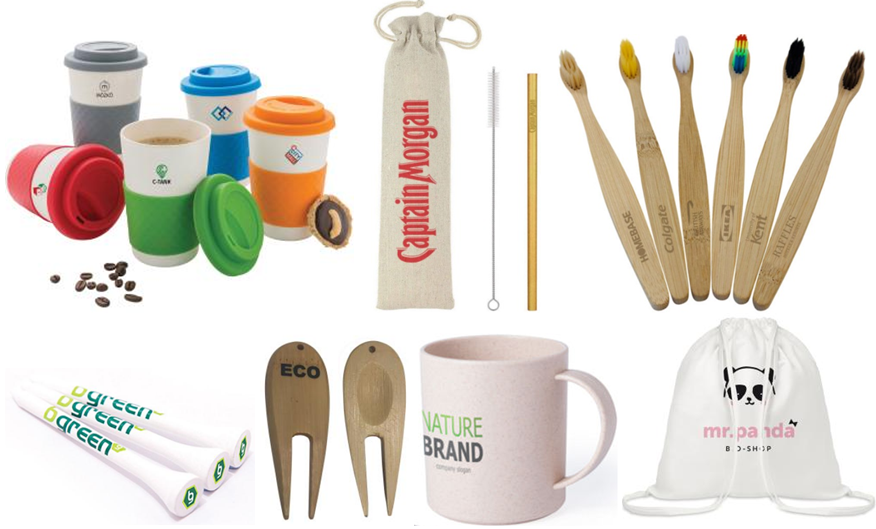
Beakers made from rice husks
What was once an agricultural by-product discarded as refuse for its apparent uselessness has become a sustainable material with numerous applications. Rice husks make a great alternative to plastic due to its durability and biodegradability.
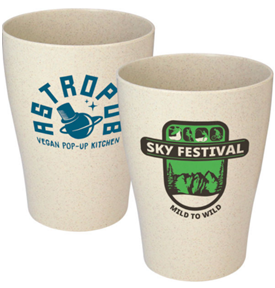
Drinks Bottles made from 100% reclaimed food grade material or made from sugar cane 100% bio based plastic
Repurposed recycled plastic milk bottles collected by recyclers to give the used product another life or sugar cane is a renewable resource as it reproduces in cycles of less than one year. The sugar cane extract is used to produce ethanol which in turn can make green polyethylene that is 100% recyclable.
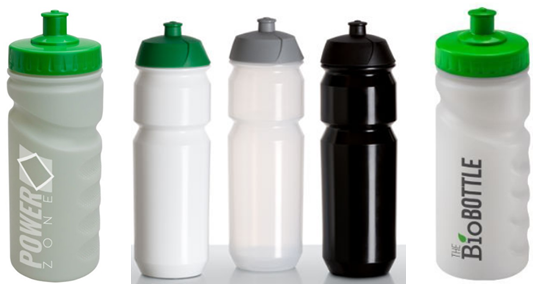
Shopper and Event Bags made from a mix of recycled cotton and recycled plastic
70% recycled cotton from offcuts, waste cotton & towels blended with 30% polyester (PET recycled plastic bottles) for extra structure or made from 60% recycled cotton T-shirt material blended with 40% polyester (R-PET recycled fabric from plastic bottles) for extra structure.
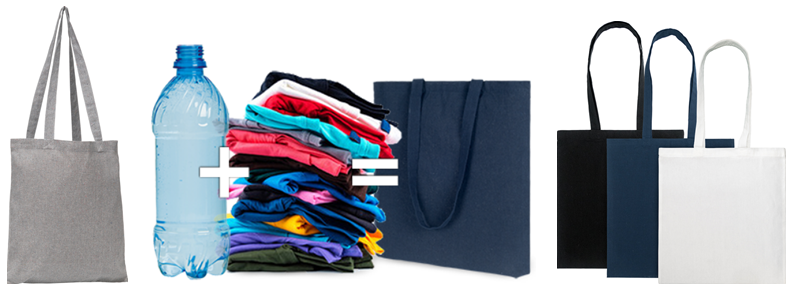
Shopper and Event Bags made from a mix of Cotton and Cork
Cork is a natural, renewable material well known for being lightweight, elastic and impermeable. It biodegrades completely and can be easily recycled without producing any toxic residues.
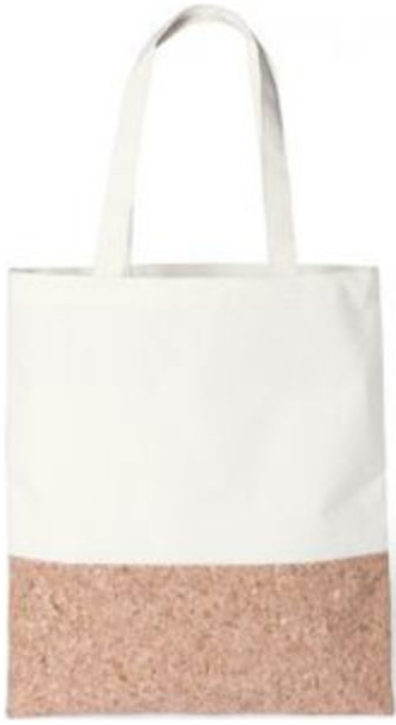
Shopper and Event Bags made from natural jute
Jute is completely biodegradable and also a recyclable fibre. Jute reaches maturity between 4-6 months, making it an incredibly efficient renewable material that is also able to absorb carbon dioxide and releases oxygen much faster than trees.
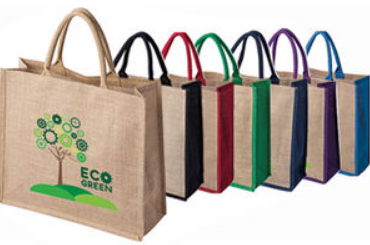
Shopper and Event Bags made from recyclable non-woven PP
Non-woven polypropylene is previously recycled plastic that can also be recycled again by melting it down to form new fabric for bags/clothes.
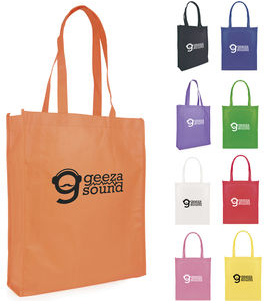
Backpacks made from recycled plastic bottles
We were all shocked to learn how much plastic waste is caused by single use plastic drinks bottles and so to reuse them in such a way that they can be recycled in to backpacks is a step forward in reducing plastic waste.
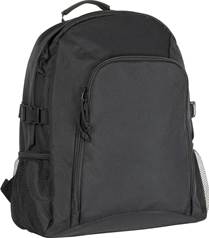
Lanyards made from bamboo, plant silk, hemp or recycled plastic
Bamboo reaches maturity within 3-5 years, once cut down for harvesting, the plant regrows making it highly sustainable. Plant silk is natural, sustainable and biodegradable. Hemp, one of the most effective carbon dioxide stores on the planet. It is believed to absorb more CO2 per hectare than any other commercial crop or forestry.

Umbrella made from recycled plastic
The canopy is made from 100% recycled PET giving another use for the vast plastic waste that a concern to us all.
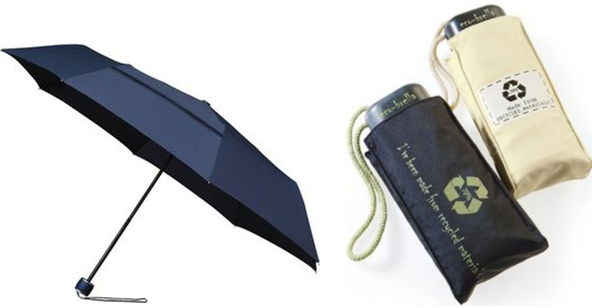
Eco-Friendly Biodegradable Stickers
Both the paper itself and the adhesive glue on these stickers is compostable.
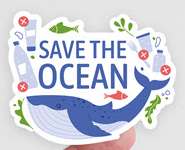
Pens made from recycled plastic
This writing instrument focuses entirely on three plastic parts made of recycled material. The mechanism does not need any other parts. An entirely clever and sustainable strategy. Materials and production processes are designed to be free of harmful substances, ecologically compatible, waste avoiding, recyclable and developed in such a way that they have a long product life.
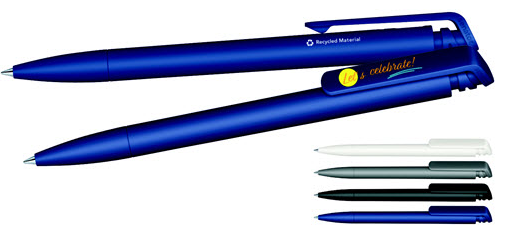
Pens made from bio-based oil (bioplastic)
Numerous pens are now made from plastic derived from plant oil.

Pens made from wheat and coffee grounds
Made from wheat and recycled coffee grounds making use of both natural and waste products.
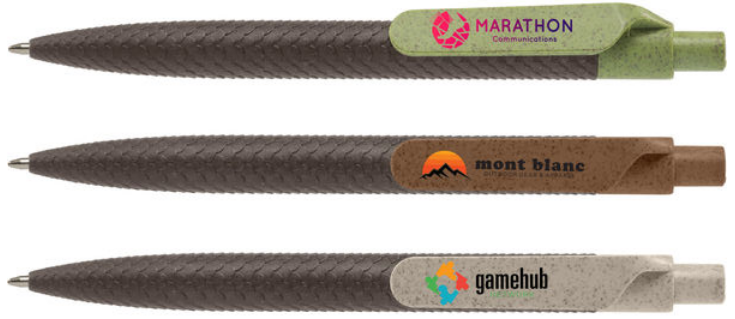
Pens made from wheat straw
Made from reclaimed wheat straw plastic. Wheat straw is the by-product that is left over after the wheat harvest, and by using it to make a plastic like substance, it is an ideal zero waste option. Wheat straw contains cellulose and by breaking it down, a new product can be created. The process creates the opportunity to make different kinds of polymers. Polymers created from wheat straw, are completely natural.
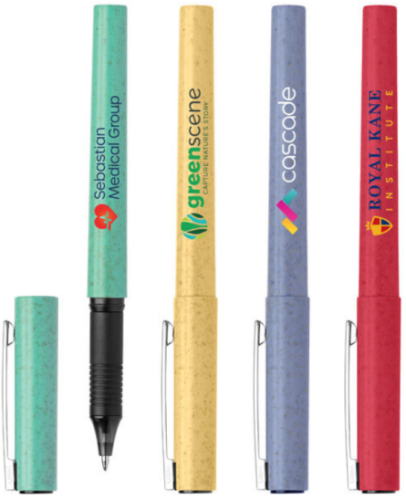
Pens made from recycled plastic
Made with 100% recycled ABS plastic or Made of rPET material, i.e. from recycled water bottles.

Pens made from bamboo
Made from bamboo that not only requires little hydration to prosper so another environmental tick in the box, bamboo also inhibits the growth of bacteria and fungi, making it a great material for hygienic writing instruments.
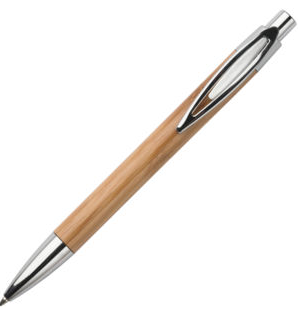
Pens and Pencils made from recycled newspaper, denim, tyres, money or CD cases
All products that might otherwise end up in landfill, these are made from either recycled newspaper, recycled denim, recycled tyres, recycled money or recycled CD cases.
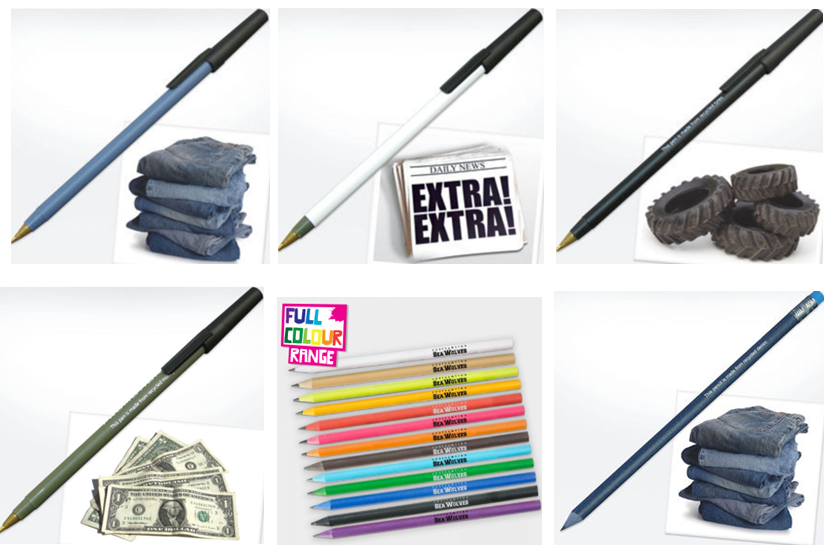
Clothing made from organic cotton or recycled polyester
Pretty much all types of apparel come in a sustainable option such as recycled polyester or organic cotton, additionally there is the option of having them printed with water based inks. Hoodies made from 80% organic cotton/20% recycled polyester; sweatshirts and t shirts made from 100% organic Fairtrade cotton and jackets made from 100% recycled polyester and snoods from recycled plastic.

Tech made from wheat straw or natural rubber
Power banks made from wheat straw and ABS. Wheat straw is natural and renewable and also a by-product of wheat production.
Mouse Mats made from open cell natural rubber that comes from plants and is therefore biodegradable.
Charging pads made from wheat straw plastic material mixed together, reducing the amount of plastic needed.
Multi-function charging cables that are both biodegradable and recyclable made from biodegradable wheat plastic and Tyvek paper cables.

Notebook made from Stone Paper or recycled card covered notebooks with recycled paper sheets
Made from stone paper over grey board stiffener. Stone paper is a superior alternative to traditional pulp paper, it requires no trees, water, waste, acids or bleaches to produce and can be recycled indefinitely. Stone paper is produced using 80%-90% calcium carbonate, one of the world's most abundant substances, it is crushed into powder form and then mixed with a non-toxic and recyclable binder such as high density polyethylene (HDPE).

Notebooks and luggage tags made from recycled leather
Recycled leather is made of leather fibres obtained from the mechanical or chemical demolition of leather waste. The waste leather goes through multiple, non-polluting cleaning processes, the end result is an environmentally safe and clean product with the feel, weight, and durability of genuine leather, but does so without polluting the environment.
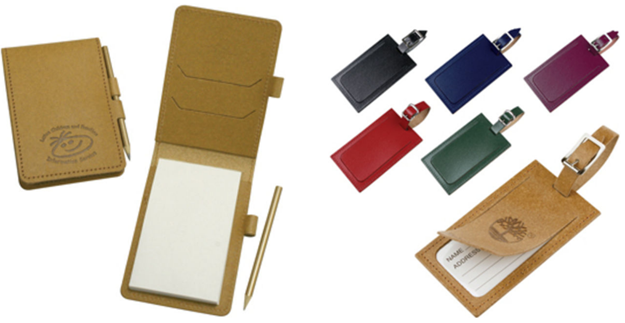
Notebooks and coasters made from cork or recycled card covered notebooks with recycled paper sheets
Cork has so many advantages, I’m certain we’ll see a rapid growth in its use for multiple applications. It benefits from, buoyancy, compressibility, resiliency, frictional quality, low thermal conductivity, ability to absorb vibration and resistance to moisture and liquid penetration making it ideal for coasters.

Sticky notes made from 100% recycled fibre
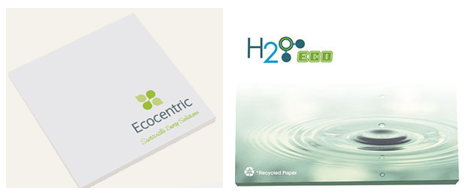
Calculators made from bamboo or Corn
Bamboo boasts a host of eco credentials. Some of which have already been mentioned. Additionally, it has a close knit rooting system which aids prevention of soil erosion and even assists in rebuilding areas of eroded earth which in turn helps combat nutrient depletion from washed away soil. Corn is a renewable resource, compostable and doesn’t produce toxic fumes if incinerated.
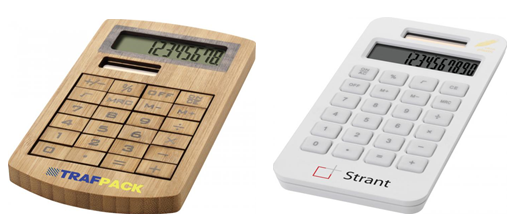
Ice Scrapers made from recycled high impact styrene
Kerb side collections currently do not accept polystyrene for recycling but it is a recyclable product and is good news that a use is being found for it rather than going to landfill or worse ending up in our oceans breaking down in to tiny beads or if burned it releases toxic fumes.
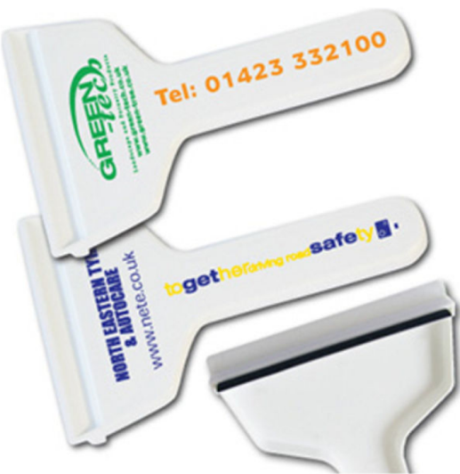
Trolley Coins made from hemp
Hemp has the benefit of not requiring pesticides or herbicides to grow and also improves growing conditions for other crops.
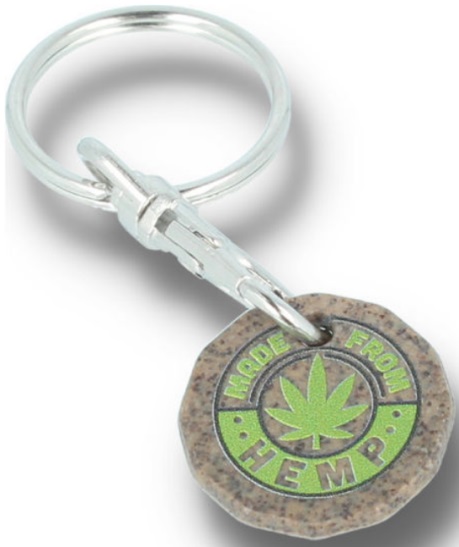
Stationery products made from recycled plastic
Made from recycled polymers including waste products with a biodegradable additive.

Plantable promotions
An advertising message on a bookmark or card with wildflower seeds embedded in the paper makes a lovely eco promotion to help increase the bee population and encourage green spaces.

Name badges made from bamboo
Renewable and sustainable, bamboo makes a great natural alternative to plastic name badges.
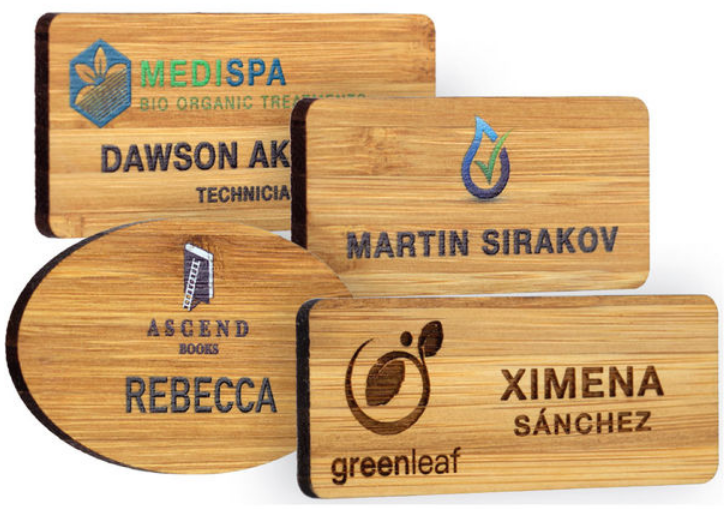
Whistles, Frisbees, yo yo’s and plant markers made from recycled plastic here in the UK

Balloons made from natural latex
Natural latex is organic, biodegradable, compostable and from a sustainable resource.
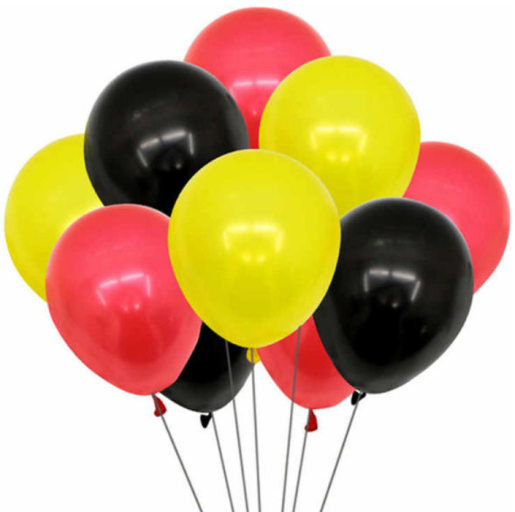
Lunch box made from a combination of bamboo and PP plastic with silicon fastening
Made from 40% bamboo and 60% recyclable polypropylene with silicon fastening. Silicone has a long life span and is less likely to leach harmful chemicals than plastics.
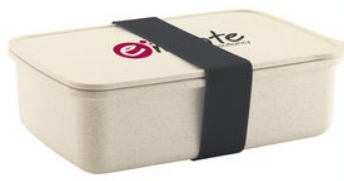
There are many more eco conscious corporate gift options just waiting to be explored.
· 96% of recipients said that promotional merchandise increases brand awareness
· 55% of respondents are more favourable to a brand after receiving a promotional gift
· 83% of people who receive promotional merchandise can remember the brand advertised for an average of 12 months
· 79% said they were likely to do business with the company in the future
The statistics speak for them self, integrating branded merchandise into your marketing campaign is a powerful way to engage with your audiences and can reaffirm customer loyalty. Aside from gaining competitive advantage, promotional products can increase your brand recognition whilst providing advertising longevity of your brand. It just requires a more considered approach to ensure the branded gifts sit comfortably with the environmental conscience of the buyer and organisation they represent.


































